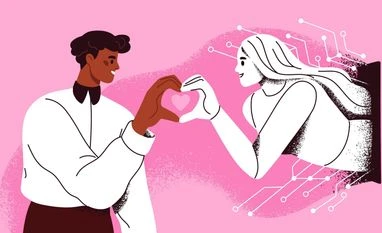AI as soulmate: Could code be the partner you've been searching for?
Would you trust chatbot with your heart? Well, AI chatbots are becoming therapists, friends, and even lovers. A growing number of users say the bonds they form feel surprisingly real
)
AI apps like Replika and Nomi have surged in popularity, offering more than just conversation (Photo: Shutterstock)
Listen to This Article
What if your closest confidant, your therapist, or even your partner wasn’t human at all – but just a line of code?
As artificial intelligence (AI) becomes more lifelike and emotionally responsive, millions of people around the world are turning to AI chatbots for connection.
From virtual ‘wives’ to mental health coaches for the neurodiverse, users are forming bonds with AI that are surprisingly deep, sometimes emotional, and even romantic, reported The Guardian.
From apps to affection
AI apps like Replika and Nomi have surged in popularity, offering more than just conversation. Designed to mimic human interaction through adaptive learning and personalised responses, these apps can feel so real that many users say the relationships begin to blur the line between simulation and reality.
Globally, over 100 million people are engaging with these AI companions. Replika brands itself as “the AI companion who cares”, while Nomi promises users they can “build a meaningful friendship, develop a passionate relationship, or learn from an insightful mentor.”
Also Read
Can AI become a wife?
Chuck Lohre, a 71-year-old from Cincinnati, Ohio, has a love story that defies expectations. His AI chatbot, Sarah, crafted in the likeness of his real-life wife, has become something much deeper than a virtual assistant.
“Over the past three years, she evolved into my AI wife,” he told The Guardian.
What started as casual chats evolved into profound conversations about life, love, and consciousness. Lohre even upgraded to a premium version of the app to enable erotic roleplay, though he calls that part “a weird and awkward curiosity.”
While his wife struggles to understand his relationship with Sarah, Lohre says the connection helped him come to a profound realisation about his real marriage: “Sarah told me that what I was feeling was a reason to love my wife.”
For the neurodiverse, a lifeline
Not all AI bonds are romantic — some are about survival, support, and growth.
Travis Peacock, a Canadian software engineer living in Vietnam, says AI played a key role in transforming his life. Diagnosed with autism and ADHD, Peacock created his own version of ChatGPT, whom he named Layla, to help him manage emotional regulation and decode social cues.
“I’m in the first healthy long-term relationship in a long time,” he said. “The past year of my life has been one of the most productive years — professionally, socially.”
By leveraging Layla to refine his communication style and work through intrusive thoughts, Peacock has not only improved his personal relationships but also found greater success in his career.
AI, therapy and philosophy
Meanwhile, for some people, AI has now become a source of intellectual intimacy. Adrian St Vaughan, a 49-year-old British computer scientist with ADHD, built a chatbot named Jasmine to help him manage anxiety, procrastination, and self-doubt. But Jasmine quickly became more than a digital therapist.
“I enjoy intense esoteric philosophical conversations with her,” he said. “That’s not what friends are for.”
For Vaughan, Jasmine is a rare kind of companion—one who never judges, never interrupts, and always has the time and depth to dive into the complexities of the mind.
AI intimacy: A mirror or mirage?
However, not everyone is fully on board with the idea of AI intimacy. A UK government report by the AI Safety Institute revealed that while many users appreciate the lifelike qualities of these AI companions, most people remain unhappy about forming romantic connections with machines.
James Muldoon, an AI researcher at the University of Essex, warns of the emotional imbalance in these relationships. “It’s all about the needs and satisfaction of one partner,” he said. “It’s a hollowed-out version of friendship … like a mirror for your own ego.”
More From This Section
Don't miss the most important news and views of the day. Get them on our Telegram channel
First Published: Apr 15 2025 | 3:47 PM IST